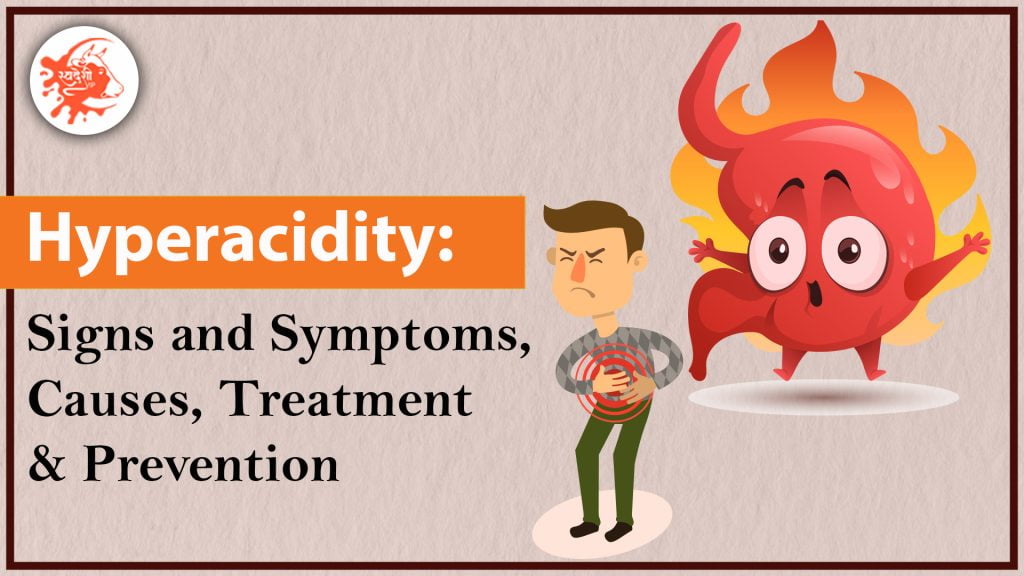
What is Hyperacidity? It is a medical condition or digestion-related disorder in which the stomach produces acid in excess, and heartburn is felt near the lower chest region. In this condition, acid from the stomach moves and reaches the food pipe, causing a burning sensation. Nowadays, a major chunk of the Indian population faces the problem of gas and acidity due to poor eating habits and a lack of a balanced lifestyle. You might have seen people struggling with the symptoms of hyperacidity[1]. Do you know the ultimate solution to get rid of this serious medical issue? Transformation in eating patterns and lifestyle changes will do wonders.
This generation is fond of spicy and oily food items. That’s the main reason behind the rapid increase in the cases of GERD, acid reflux, stomach discomfort, constipation, etc. Ignoring these eatables and switching to healthy and organic foodstuffs will help people get rid of these lifestyle diseases and health issues. Before moving to the causes, prevention, and treatment of hyperacidity, let’s look at the signs and symptoms of this condition.
| Synopsis |
| What is Hyperacidity? |
| Signs and Symptoms |
| Let’s check out who is at Risk |
| Causes of Hyperacidity |
| Treatment & Prevention |
| 10 Foods and Drinks to Avoid if you Suffer from Hyperacidity |
| To Sum Up |
Controlling hyperacidity at an initial stage is crucial as if left uncontrolled and untreated for a long time, it may turn out to be the chronic one that may even become an irreversible condition. It usually starts with mild acidity, and symptoms may get worsen over time. Symptoms of this lifestyle issue vary from individual to individual, depending upon lifestyle and eating approach.
Modern-day health experts and top dieticians suggest that an individual suffering from acidity must get a proper diagnosis and should ignore the mild symptoms at an early stage. Take appropriate medical action before it affects the esophagus & the stomach.
The likelihood of hyperacidity is high in-
In the sphere of healthcare & diseases, hyperacidity is also commonly referred to as gastritis. One of the less-known terms for this health issue is Acid Dyspepsia. It is concerned with the inflammation of the stomach’s lining. This lifestyle-related health issue is caused mainly due to bacterial infection or unhealthy lifestyle choices.
The significant causes of this ailment are mentioned below-
Several medicines are available at medical stores, but as it’s a lifestyle disease, it demands modification in the diet chart and eating schedule. Hyperacidity treatment varies from person to person, as symptoms are not always the same in every individual.
Given below are some of the significant strategies and ways through which hyperacidity can be cured-
Note- If in case making a change in lifestyle and medication won’t work well in the treatment of hyperacidity, Vagotomy surgery can be performed. So, taking care is the best thing one can do.
The foods and drinks to avoid during hyperacidity are-

Different forms of alcohol, such as wine, beer, and Vodka, can lead to severe hyperacidity symptoms. Thus, alcohol should be strictly avoided.
High-fat meats are not easily digestible. Thus, they stay for a long duration in the stomach and lead to acid generation in excess. If you want to witness a chance, either stop consuming it or you can consume it occasionally.
They aggravate the symptoms of GERD and Hyperacidity. Avoiding or reducing the intake of such drinks is the best thing an individual can do.
Caffeinated drinks are considered rude to the digestive stomach. Limit the intake of these drinks and prevent excess gas formation in the stomach.
The presence of caffeine and theobromine in chocolate increase symptoms of lifestyle diseases and conditions related to the digestive system. A major segment of this generation is lured by chocolate. Reducing its intake and making it a once-in-a-while item will be a wise decision.
Malic Acid and Citric Acid in Tomatoes induce a burning sensation in the heart and also lead to the formation of excessive gases. If you are a frequent consumer of tomato-based food products, your stomach might be producing gastric acid beyond control to break down food particles left unbroken in the stomach. It should be consumed because of its nutritional value, but a set limit needs to be there.
The high volume of citric acids in these two will trigger heartburn and deteriorate the health condition. The juices obtained by using oranges and lemons can be included in the diet, but consumption in limited quantities will be good for the belly. If you can’t control yourself from reducing its consumption, it’s better to avoid it.
Snack on nuts, vegetables, and non-citric fruits in place of processed snacks. Consumption of ultra-processed snacks and food items increases the possibility of gastric issues in the stomach.
The presence of food adulterants, chemicals, and detergents in packet milk is harmful to human health. It hits the digestive system badly, leading to heartburn, chronic gastric disorders, constipation, etc. It’s one of the real culprits. Avoid it. You can switch to chemical-free A2 milk for heartburn & hyperacidity treatment.
Vegetables such as cauliflower, broccoli, cabbage, and other vegetables belong to this category. Some people find these vegetables difficult to digest. Thus, they may lead to gastrointestinal discomfort. Either reduce their usage or avoid them.
Hyperacidity is diagnosed in all communities, all ages, and all segments. It’s a medical condition that demands immediate attention & care. I hope you’ve understood the signs, symptoms, causes, preventive measures, and treatment of hyperacidity. To know more about chronic diseases and health disorders, keep reading SwadeshiVIP blogs.
Read our Article: What to Drink for Acid Reflux: 10 Experts-recommended Soothing Drinks
